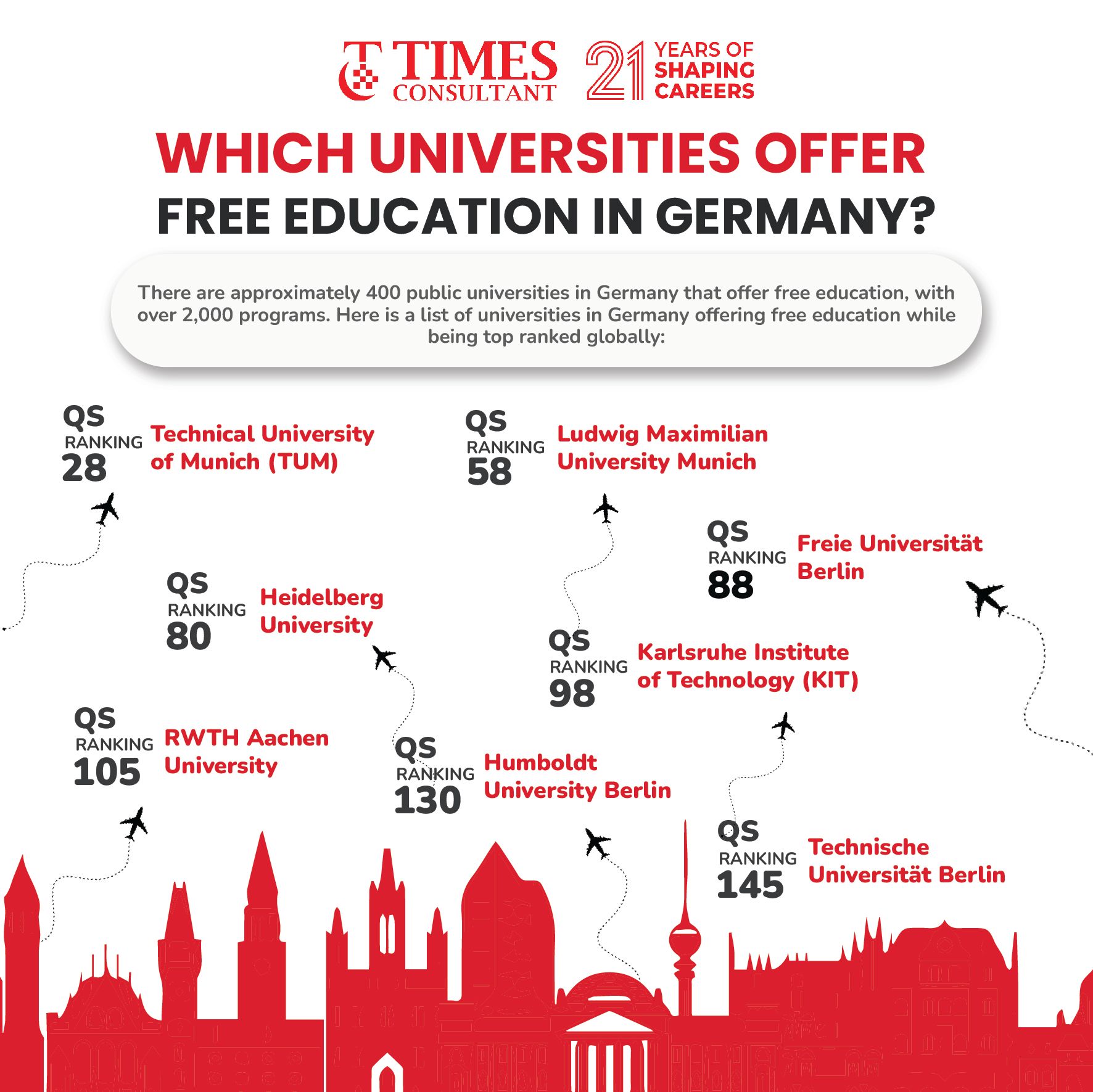

Free Education in Germany
Complete guide to free education in Germany
When it comes to free education in Europe, Germany stands out, offering tuition-free education to all students from around the world. The free education in Germany for international students policy is rooted in the belief that education is a public right and not a privilege. While other countries have experimented with various funding models, Germany has consistently proved that academic excellence and financial accessibility can coexist. The best part is that free education is accessible to European, non-European, and all international students from around the world, irrespective of their origin.
Who Can Study in Germany for Free?
Students from Germany, Europe, and other regions are eligible for free studies in Germany. Regardless of whether you are from Asia, Africa, or any other place, Germany offers free education to everyone. Free education in Germany for Pakistani students applies to all undergraduate and graduate programs at public institutions.
The main exception is Baden-Württemberg, where non-EU students pay about €1,500 per semester. Still a bargain compared to U.S. or UK prices! The executive and professional programs, such as the LLM, MBA, MPA, and the Erasmus Mundus joint master's degree, are also exceptions.
Language Requirements:
- Many programs require German proficiency (usually B2/C1 level)
- Over 1,000 programs taught entirely in English
- Some universities offer free German courses to international students
Why is Education Free in Germany?
Germany believes that education is a fundamental right, not a privilege. This philosophy stems from a long-standing commitment to accessible education and is supported by the country's tax system. They have established a network of public universities over the years that offer free education to both domestic and international students.
Universities offering free education in Germany are seen as key to a stronger economy and a fairer society. Back in the 2000s, public universities briefly charged tuition of about 1,000 euros a year, but after massive protests, the fees were scrapped in 2014. Now, almost all public universities are free again, with just a handful of exceptions. The nation also views it as a means to attract talented individuals to immigrate to their country.
That's why they've made it easy for international students to study tuition-free, hoping for them to stay after graduation to work and contribute to a better future for the world.
Which universities offer free education in Germany?
There are approximately 400 public universities in Germany that offer free education, with over 2,000 programs. Here is a list of universities in Germany offering free education while being top ranked globally:
| University | QS Ranking |
|---|---|
| Technical University of Munich (TUM) | 28 |
| Ludwig Maximilian University Munich | 58 |
| Heidelberg University | 80 |
| Freie Universität Berlin | 88 |
| Karlsruhe Institute of Technology (KIT) | 98 |
| RWTH Aachen University | 105 |
| Humboldt University Berlin | 130 |
| Technische Universität Berlin | 145 |

In what cases is education not free in Germany?
Private Universities
Studying at a private university in Germany costs between €10,000 and €15,000 per year for a Bachelor's degree and between €10,000 and €20,000 per year for a Master's degree. The fees for specialized programs at private universities are significantly higher than those at public universities offering free education in Germany.
Non-Consecutive Master's Programs
Non-consecutive Master's programs are for students who want to switch fields after their Bachelor's degree. Unlike the free education in Germany for Master's in public universities, these non-consecutive Master's programs are paid.
Second Degrees (Zweitstudium)
Students pursuing a second Bachelor's degree or a Master's degree in a completely different field are required to pay tuition fees. These programs, known as Zweitstudium, generally cost between €500 and €650 per semester at public universities.
Public Universities in Baden-Württemberg
Baden-Württemberg is the only German state that charges tuition fees for non-EU/EEA students at public universities, the fees amount to €1,500 per semester, or €3,000 per year.
Public Universities in Bavaria
In 2023, Bavaria allowed its public universities to charge tuition fees for non-EU international students. The exact costs vary by institution, as the decision is left to individual universities to determine.
How Does "Free" Really Work?
"Free" means no tuition fees at public universities. However, there's a small semester contribution (Semesterbeitrag) ranging from €200 to €350. This covers student services, public transportation pass, administrative costs, and student union fees. This total is less than what many American students spend on textbooks for a single course!
While tuition is free, you'll need to budget for living expenses:
Monthly Costs (approximate):
- Rent: €350-600
- Food: €200-300
- Health insurance: €110
- Phone/internet: €30
- Transportation: Covered by semester fee
- Entertainment: €100-200
Total: €800-1,200 per month
Common myths about free education in Germany:
Lets address some common myths spread by people about free education in Germany.
-
Myth: "Free means lower quality."
Reality: German universities consistently rank among the world's best, especially in engineering and technology. -
Myth: "It's too competitive."
Reality: Admission rates are often higher than in the U.S., though popular programs are selective. -
Myth: "You must speak perfect German."
Reality: Many programs are taught in English, and universities support language learning.
Fully funded scholarships in Germany:
Since the tuition fees are already covered by universities that offer free education in Germany, some fully funded scholarships can also help with your living expenses. Explore these scholarships to understand how to get free education in Germany.
DAAD Scholarships
The German Academic Exchange Service (DAAD) offers comprehensive scholarships covering living expenses, accommodation, and health insurance for international students. These awards are available for Bachelor's, master's, and PhD programs across all academic fields.
Erasmus+ Scholarships
Funded by the European Union, Erasmus+ scholarships provide financial support for living and travel costs. This popular program enables students to study abroad while engaging with diverse European cultures.
University Scholarships
Universities in Germany offering free education to international students also have scholarship programs that provide support for living costs and housing. There are subject and region specific scholarships too.
Private Scholarships
German foundations, companies, and organizations offer scholarships to international students. These awards assist with study-related expenses, accommodation, or general living costs, with eligibility varying by provider. Free education in Germany for bachelors, masters, or Phd, all expenses are covered by these private scholarships.
Application Process to Study in Germany:
Program Selection
- Research programs via DAAD.de
- Check admission requirements
- Verify language requirements
2. Document Preparation
- High school diploma/previous degrees
- Language certificates
- Motivation letter
- CV/resume
- Recommendation letters
3. Application Submission
- Apply through Uni-Assist (central service)
- Or directly to universities
- Pay application processing fee (€75 for the first application)
4. Visa Process (Non-EU Students)
- Apply after acceptance
- Show proof of funds (€11,208 blocked account)
- Health insurance
- Admission letter
Final Thoughts
By removing financial barriers to higher education, Germany has created a system that prioritizes merit, talent, and dedication over economic status. This approach not only benefits German citizens but also attracts talented international students, contributing to the country's cultural diversity and intellectual capital. This free education has created an inclusive environment for domestic and international students studying in Germany.
For more information about Germany's free education, contact Times Consultant today and begin your free study abroad journey.
Recent Blogs
Talk to a Study Abroad Expert
Get personalised guidance from Times Consultant within 24 hours.
Tags
- free education
Recent Blogs
Tags
- free education

